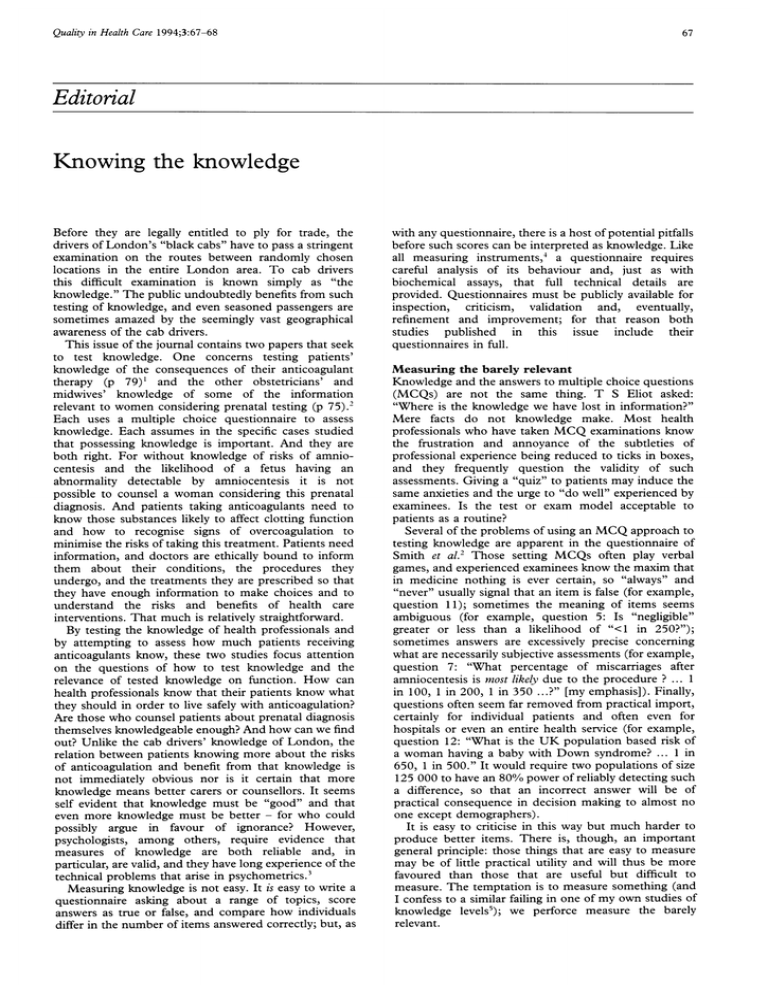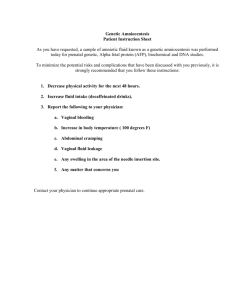Editorial Knowing the knowledge
advertisement

Quality in Health Care 1994;3:67-68 67 Editorial Knowing the knowledge Before they are legally entitled to ply for trade, the drivers of London's "black cabs" have to pass a stringent examination on the routes between randomly chosen locations in the entire London area. To cab drivers this difficult examination is known simply as "the knowledge." The public undoubtedly benefits from such testing of knowledge, and even seasoned passengers are sometimes amazed by the seemingly vast geographical awareness of the cab drivers. This issue of the journal contains two papers that seek to test knowledge. One concerns testing patients' knowledge of the consequences of their anticoagulant therapy (p 79)1 and the other obstetricians' and midwives' knowledge of some of the information relevant to women considering prenatal testing (p 75).' Each uses a multiple choice questionnaire to assess knowledge. Each assumes in the specific cases studied that possessing knowledge is important. And they are both right. For without knowledge of risks of amniocentesis and the likelihood of a fetus having an abnormality detectable by amniocentesis it is not possible to counsel a woman considering this prenatal diagnosis. And patients taking anticoagulants need to know those substances likely to affect clotting function and how to recognise signs of overcoagulation to minimise the risks of taking this treatment. Patients need information, and doctors are ethically bound to inform them about their conditions, the procedures they undergo, and the treatments they are prescribed so that they have enough information to make choices and to understand the risks and benefits of health care interventions. That much is relatively straightforward. By testing the knowledge of health professionals and by attempting to assess how much patients receiving anticoagulants know, these two studies focus attention on the questions of how to test knowledge and the relevance of tested knowledge on function. How can health professionals know that their patients know what they should in order to live safely with anticoagulation? Are those who counsel patients about prenatal diagnosis themselves knowledgeable enough? And how can we find out? Unlike the cab drivers' knowledge of London, the relation between patients knowing more about the risks of anticoagulation and benefit from that knowledge is not immediately obvious nor is it certain that more knowledge means better carers or counsellors. It seems self evident that knowledge must be "good" and that even more knowledge must be better- for who could possibly argue in favour of ignorance? However, psychologists, among others, require evidence that measures of knowledge are both reliable and, in particular, are valid, and they have long experience of the technical problems that arise in psychometrics.3 Measuring knowledge is not easy. It is easy to write a questionnaire asking about a range of topics, score answers as true or false, and compare how individuals differ in the number of items answered correctly; but, as with any questionnaire, there is a host of potential pitfalls before such scores can be interpreted as knowledge. Like all measuring instruments,4 a questionnaire requires careful analysis of its behaviour and, just as with biochemical assays, that full technical details are provided. Questionnaires must be publicly available for inspection, criticism, validation and, eventually, refinement and improvement; for that reason both studies published in this issue include their questionnaires in full. Measuring the barely relevant Knowledge and the answers to multiple choice questions (MCQs) are not the same thing. T S Eliot asked: "Where is the knowledge we have lost in information?" Mere facts do not knowledge make. Most health professionals who have taken MCQ examinations know the frustration and annoyance of the subtleties of professional experience being reduced to ticks in boxes, and they frequently question the validity of such assessments. Giving a "quiz" to patients may induce the same anxieties and the urge to "do well" experienced by examinees. Is the test or exam model acceptable to patients as a routine? Several of the problems of using an MCQ approach to testing knowledge are apparent in the questionnaire of Smith et al.2 Those setting MCQs often play verbal games, and experienced examinees know the maxim that in medicine nothing is ever certain, so "always" and "never" usually signal that an item is false (for example, question 11); sometimes the meaning of items seems ambiguous (for example, question 5: Is "negligible" greater or less than a likelihood of "<1 in 250?"); sometimes answers are excessively precise concerning what are necessarily subjective assessments (for example, question 7: "What percentage of miscarriages after amniocentesis is most likely due to the procedure ? ... 1 in 100, 1 in 200, 1 in 350 ...?" [my emphasis]). Finally, questions often seem far removed from practical import, certainly for individual patients and often even for hospitals or even an entire health service (for example, question 12: "What is the UK population based risk of a woman having a baby with Down syndrome? ... 1 in 650, 1 in 500." It would require two populations of size 125 000 to have an 80% power of reliably detecting such a difference, so that an incorrect answer will be of practical consequence in decision making to almost no one except demographers). It is easy to criticise in this way but much harder to produce better items. There is, though, an important general principle: those things that are easy to measure may be of little practical utility and will thus be more favoured than those that are useful but difficult to measure. The temptation is to measure something (and I confess to a similar failing in one of my own studies of knowledge levels5); we perforce measure the barely relevant. 68 False precision Another part of the problem is that many questions require surprisingly precise quantitative answers, but quantities are probably not represented psychologically as numbers; instead natural language (and probably the cognitive system) uses a range of verbal quantifiers (rare, unusual, unlikely, common, frequent) which modify statements and which do not correspond simply to proportions, or even to ranges of proportions, but also depend on our expectations of likely values.6 Although 1 in 650 sounds precise and scientific, the seeming precision is almost certainly false (what was the standard error of the estimate in the original study, what is the variation between populations, and how similar is the study population to the individual to whom we are providing the information?), and it is almost certainly not comprehended as a proportion either by the giver or the receiver. A related problem is that the same information presented in different ways can seem very different: 1 case in 100 000 a year sounds reassuringly rare, while the same figure expressed as 600 cases a year in the United Kingdom population of 60 million seems worryingly high. Absolute standards We must be aware of the problems of trying to assess absolute levels of knowledge, rather than relative levels. It is a simple trick to show either that knowledge is very high (by setting easy questions) or very poor (by setting difficult questions). There is nothing magic about 50% knowledge, even if it is a pass mark in many examinations. Just as examiners are probably capable of comparing candidates only in relative terms,7 so the assessment of knowledge in health care is also probably relative. Of course we do expect doctors to know that the knee bone is connected to the shin bone, and there must be a level of ignorance which would make it impossible for a health professional, however good their communication skills, to counsel women effectively about prenatal testing, but beyond that it is exceedingly difficult to set meaningful absolute standards. Useful studies If studies of knowledge are to be useful then they must transcend simple comparison of groups on knowledge Editorial measures themselves. Validation of knowledge measures requires that patients with greater knowledge are shown to have better outcomes (in this case take anticoagulants more safely) or that professionals with greater knowledge have patients who are more satisfied or do better on other outcomes, whether objective or subjective, and, for prenatal diagnosis, are able to make more properly informed decisions. That is not an easy requirement. But these two studies have opened a debate crucial to the delivery of good quality care and they challenge us to consider the relation between knowledge and function. Their focus was on two specific areas of care, but the implications are wide. T S Eliot, in the line preceding that already quoted, asked: "Where is the wisdom we have lost in knowledge?" Ultimately, it is wisdom which patients are seeking. Patients may seem to ask for facts, and providing profuse facts, seemingly under the guise of informed decision making or patient empowerment, may act as a mechanism to defend the ego of vulnerable health care professionals; but it is probably wise counsel (and wise counselling) that patients really desire. Regrettably, the measurement of wisdom is as yet far beyond the scope of psychometrics. I C McMANUS Professor of Psychology, St Mary's Hospital Medical School, Imperial College of Science, Technology and Medicine, London W2 IPG Taylor FC, Ramsay ME, Tan G, Gabbay J, Cohen H. Evaluation of patients' knowledge about anticoagulant treatment. Quality in Health Care 1994;3:79-85. 2 Smith DK, Slack J, Shaw RW, Marteau TM. Lack of knowledge in health 1 professionals: a barrier to providing information to patients? Quality in Health Care 1994;3:75-8. 3 Ghiselli EE, Campbell JP, Zedeck S. Measurenment theory'for the behavioral sciences. San Francisco: Freeman, 1981. 4 Peck DF, Shapiro CM. Guidelines for the construction, selection and interpretation of measurement devices. In: Peck DF, Shapiro CM, eds. Measuring humnan problems: a practical guide. Chichester: Wiley, 1990;1-12. 5 Morton AD, McManus IC. Attitudes to and knowledge about the acquired immune deficiency syndrome: lack of a correlation. BMJ 1986;293: 1212. 6 Moxey LM, Sanford AJ. Communicating quantities: a psychological perspective. Hove, UK: Lawrence Erlbaum, 1993. 7 Laming D. The reliability of a certain university examination compared with the precision of absolute judgements. Quarterly Journal of Experim7ental Psychology 1990;2239-54.

